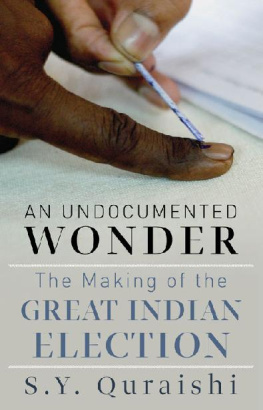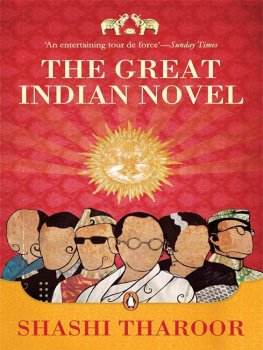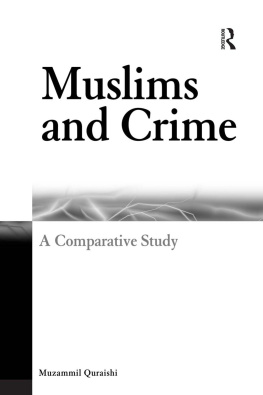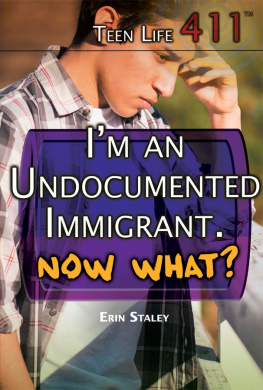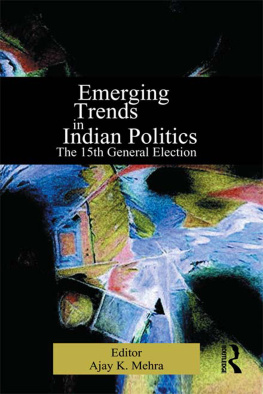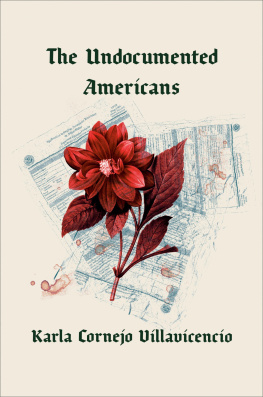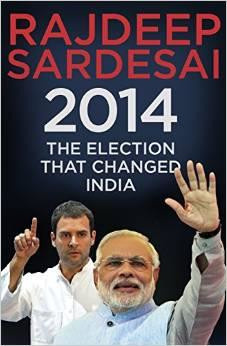S. Y. Quraishi - An Undocumented Wonder - The Making of the Great Indian Election
Here you can read online S. Y. Quraishi - An Undocumented Wonder - The Making of the Great Indian Election full text of the book (entire story) in english for free. Download pdf and epub, get meaning, cover and reviews about this ebook. City: New Delhi, year: 2014, publisher: Rupa Publications India Private Limited, genre: Science / Politics. Description of the work, (preface) as well as reviews are available. Best literature library LitArk.com created for fans of good reading and offers a wide selection of genres:
Romance novel
Science fiction
Adventure
Detective
Science
History
Home and family
Prose
Art
Politics
Computer
Non-fiction
Religion
Business
Children
Humor
Choose a favorite category and find really read worthwhile books. Enjoy immersion in the world of imagination, feel the emotions of the characters or learn something new for yourself, make an fascinating discovery.
- Book:An Undocumented Wonder - The Making of the Great Indian Election
- Author:
- Publisher:Rupa Publications India Private Limited
- Genre:
- Year:2014
- City:New Delhi
- Rating:4 / 5
- Favourites:Add to favourites
- Your mark:
- 80
- 1
- 2
- 3
- 4
- 5
An Undocumented Wonder - The Making of the Great Indian Election: summary, description and annotation
We offer to read an annotation, description, summary or preface (depends on what the author of the book "An Undocumented Wonder - The Making of the Great Indian Election" wrote himself). If you haven't found the necessary information about the book — write in the comments, we will try to find it.
S. Y. Quraishi: author's other books
Who wrote An Undocumented Wonder - The Making of the Great Indian Election? Find out the surname, the name of the author of the book and a list of all author's works by series.
An Undocumented Wonder - The Making of the Great Indian Election — read online for free the complete book (whole text) full work
Below is the text of the book, divided by pages. System saving the place of the last page read, allows you to conveniently read the book "An Undocumented Wonder - The Making of the Great Indian Election" online for free, without having to search again every time where you left off. Put a bookmark, and you can go to the page where you finished reading at any time.
Font size:
Interval:
Bookmark:
UNDOCUMENTED
WONDER

Published in Rainlight
by Rupa Publications India Pvt. Ltd 2014
7/16, Ansari Road, Daryaganj
New Delhi 110002
Sales centres:
Allahabad Bengaluru Chennai
Hyderabad Jaipur Kathmandu
Kolkata Mumbai
Copyright S.Y. Quraishi 2014
All rights reserved.
No part of this publication may be reproduced, transmitted, or stored in a retrieval system, in any form or by any means, electronic, mechanical, photocopying, recording or otherwise, without the prior permission of the publisher.
While every effort has been made to obtain permissions, any omissions brought to our attention will be remedied in future editions.
eISBN: 9788129134080
The moral right of the author has been asserted.
This book is sold subject to the condition that it shall not, by way of trade or otherwise, be lent, resold, hired out, or otherwise circulated, without the publisher's prior consent, in any form of binding or cover other than that in which it is published.
Dedicated to
the memory of my father,
Maulana Zubair Quraishi, who instilled in
me the value of the pursuit of knowledge
and the desire to excel.
I mean to diminish no individual, institution or phase in our history when I say that India is valued the world over for a great many things, but for three over all others:
The Taj Mahal
Mahatma Gandhi
Indias electoral democracy
The credit for the last of the three fames goes to the people of India who have embodied that achievement and given it utterance. It also goes to the political parties of India who have recognized the value of the electoral system though they have had to take the bitters of defeat no less than the sweets of victory. And it goes, very specially and tellingly, to that which has given Indias electoral democracy shape and definition, namely, the Election Commission of India (ECI).
The people of India are the propulsive fuel, the driving energy, of the vehicle of Indias electoral democracy. Our political parties are its complex and often convoluted innards. But the vehicles engine, where ignition and combustion take place and where the fuel and engine combine to move the vehicle forward, is the ECI. And behind the vehicles steering wheel is the Chief Election Commissioner of India, the CEC as he is called. (I do hope that seat which has until now been monopolized by gentlemen, will soon be manned by one of the many outstanding women officers who serve our country.)
One of the most remarkable CECs that we have ever had or are likely to have is S.Y. Quraishi. He has given us in this volume a vivid portrayal of what makes Indias elections work and prevail over the many obstacles that confront it. And by so doing he has not just given us information and knowledge but confidence and pride.
Elections are our pride. They have operationalized for us a fundamental goal of our freedom struggle, namely, popular representation in the countrys legislative bodies. In other words, they have given us, the people of India, a voice in determining the way our lives are run. This has been no easy task. In a country as large as India with a bewildering diversity, strong sentiments, a predisposition to take offense and a tradition of feudal prescriptions being dictated from the vantage of caste, class and doctrinaire hierarchies, the ECI has shown monumental forbearance. Not only has the ECI had to contend with undemocratic latencies in our society, it has also had to address attempts at counter-democratic subversions in the form of new and ingenious manipulations of the electoral procedures and processes. The manner in which the ECI, our CECs and Election Commissioners (ECs) have kept their faith and maintained composure has been nothing less than remarkable. It is because of this that our electoral democracy has stayed the course with our election laws, and after the catharsis of polling and counting, delivered, time and again, mandates while maintaining the assurance of voter confidentiality, fairness and freedom.
The biggest attempt at manipulation of the electoral system has come from money and the attempted use of what is best described in a straightforward mannerundisguised bullying.
The mass of Indias people, our huge and growing electorate and the ECI have, in a remarkable partnership, defeated these attempts; though in several individual battles the manipulators have won.
The Commission knows, better than others, how money, authorized and unauthorized, and human biceps and triceps, authorized in the armed personnel billeted to election duty and unauthorized in others, can play a role in the proceedings.
Small arms like the pistol, the hand grenade, the rocket-propelled grenade, the landmine and the sub-machine gun, associated with the ubiquitous muscle-man, come into play. Which political party has been able to keep the mustanda out?
Giving the S. Ranganathan Memorial Lecture in New Delhi in 2007, I quoted C. Rajagopalachari from a diary he maintained while in Vellore Jail in 192122. A soldier fighting for Swaraj, he could yet have the uncanny foresight and inconvenient objectivity to say the following:
We all ought to know that Swaraj will not at once or, I think, even for a long time to come, be better government or greater happiness for the people. Elections and their corruptions, injustice, and the power and tyranny of wealth, and inefficiency of administration, will make a hell of life as soon as freedom is given to us. Believe it or not, this was written twenty-five years before independence. He continues, Men will look regretfully back to the old regime of comparative justice, and efficient, peaceful, more or less honest administration. The only thing gained will be that as a race we will be saved from dishonour and subordination. Hope lies only in universal education by which right conduct, fear of God, and love will be developed among the citizens from childhood. It is only if we succeed in this that Swaraj will mean happiness. Otherwise, it will mean the grinding injustices and tyranny of wealth.
In the first few years since 1937, elections meant the chance to select, objectively, A over B. Today, it can still mean that. However, it cannot but mean the pitting of As money resources against those of B. Elections have come, by definition, to mean the infusing of candidature with cash. The weaker the candidate, the stronger the cash. The glamour of moneywhite, black and greypervades the election air.
An incident from the 1937 elections has been recounted by Lal Bahadur Shastri in a 1959 tribute to Jawaharlal Nehru:
The general elections under the new Government of India Act took place in 1937; they were of great significance. In these elections Nehru played a very important role. I remember his visit to the district of Allahabad. It was about 8.30 p.m. when he finished his speech. As soon as he had done so, he enquired from the local Congressmen whether he could leave. Pat came the reply, Yes, sir. After having driven about a furlong Jawaharlal said that the Congress workers of Mirzapur had no sense of hospitality. I said I wanted to go and they agreed to it without even offering me a cup of tea. Nehru had taken no tea in the afternoon and [] he was feeling very hungry. He asked me whether there was any restaurant in the city [] I remembered the railway station where one could get some tea. He said, Let us go there. We motored to the railway station and went to the railway restaurant. After having the tea we were asked to pay the bill. Every one of us searched his pockets and found that none of us carried sufficient money. Between us we could collect about two and a half rupees. Nehru had about a rupee and a quarter, Mrs Purnima Banerjee another rupee and I gave the few annas to complete the full amount required. How awkward would it have been if we had failed to make up the amount among ourselves!
Font size:
Interval:
Bookmark:
Similar books «An Undocumented Wonder - The Making of the Great Indian Election»
Look at similar books to An Undocumented Wonder - The Making of the Great Indian Election. We have selected literature similar in name and meaning in the hope of providing readers with more options to find new, interesting, not yet read works.
Discussion, reviews of the book An Undocumented Wonder - The Making of the Great Indian Election and just readers' own opinions. Leave your comments, write what you think about the work, its meaning or the main characters. Specify what exactly you liked and what you didn't like, and why you think so.

